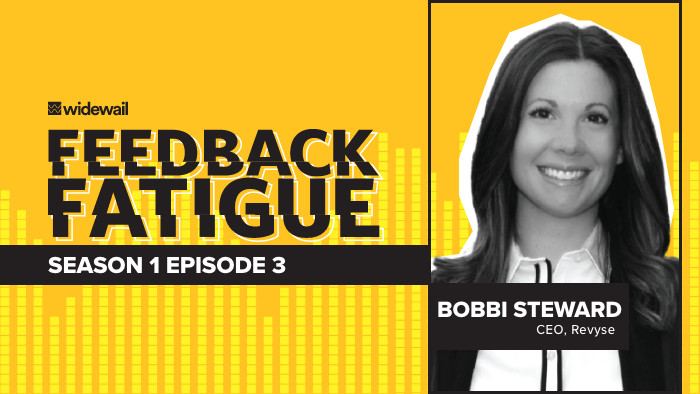-
Products
TechnologyManaged Services
- Resources
- Pricing
- Company
Bobbi Steward of Revyse shares strategies for creating a feedback-driven culture, using transparency and customer input to refine business tactics.

In Season 1, Episode 3 of Feedback Fatigue, we sit down with Bobbi Steward, CEO of Revyse, to explore customer feedback's critical role in shaping her marketing and overall business strategy.
Bobbi emphasizes the value of a feedback-driven culture, where customer, employee, and stakeholder input is actively leveraged to drive continuous improvement.
Throughout the episode, Bobbi shares clear, actionable insights on maximizing the impact of feedback in her operations. Listen to the full episode below:
Bobbi underscores the importance of iterating her pitch, product, and messaging by actively seeking feedback. She views every product demo, pitch meeting, and casual conversation as a test of what resonates with her audience.
Bobbi gathers real-time insights into what works and what doesn’t by closely monitoring reactions, timing, and clarity. This approach has enabled her to fine-tune Revyse’s core messaging, ensuring it aligns closely with client needs.
“Every time we demo the product to a potential customer, every time we interview a new employee, I'm delivering the pitch... and I'm gauging feedback. Did it land? How much time did it take for the person I'm speaking with to connect with and understand what it was I was saying? So, I take little pieces of it every time... and then just tweaking that for the situation, for the audience, and for the expectations of the presentation.”
One of Bobbi’s core philosophies is creating a culture that accepts and thrives on feedback. At Revyse, she has instilled a feedback loop where employees are encouraged to bring up both positive and negative input, knowing that it will be discussed and acted upon. This culture, she argues, makes the business agile and responsive, improving performance at all levels.
“At Revyse, we have a document called our Vivid Vision... one of the principles we wrote down... was, if no one disagrees, then we didn’t think through the problem well enough. If we all come out with the same conclusion, then we failed because there is something about allowing people to think around and under and through a problem... it unlocks a different level of creativity and problem-solving.”
This level of transparency ensures that employees are aware of the broader business landscape. It also encourages them to share their ideas and concerns, leading to stronger alignment and more innovative solutions.
One facet of Bobbi’s strategy is to “over-communicate always.” She believes that for teams to execute effectively, they must have the full context—not just the what, but the why behind every decision.
“It’s my job as a leader to set the stage and to give them all of the information, whether it’s company health or feedback so that they have the full context to make decisions autonomously and row in the same direction”
This philosophy extends to customers as well: whether it's a new product feature, a process change, or an issue that needs addressing, Bobbi ensures that all parties involved are fully informed, reducing confusion and increasing buy-in.
Bobbi doesn’t shy away from difficult feedback. She believes that uncomfortable, constructive criticism is most valuable for business growth. When faced with negative feedback, she encourages open, honest conversations where the goal is not to assign blame but to find solutions. Through this process, her team can extract valuable insights and develop clear action plans.
“It’s really easy to take positive feedback and do something with it, to amplify it, to share it, to continue pushing in that direction. But when it’s uncomfortable feedback... it’s hard to figure out what the best first step is... creating space to discuss it in a way where the intent is not to point fingers, but it’s to talk about the context of the hard feedback and just... have that conversation.”
Bobbi stresses the power of public feedback, particularly online reviews. She shares a story where invoking public reviews finally elicited a response from an unresponsive vendor.
“I reached out to the support team and didn’t get a response. This went on for five weeks... I was like, okay, what can I do? And so I reached out to the account manager and said, ‘Hey, I’ve started reading all of your reviews online. I’ve read your Google reviews... G2 reviews... Better Business Bureau reviews.’ And they responded immediately. But it was also really disheartening to know that that was the motivation.”
This experience solidified her belief that companies must not only monitor but also actively respond to public feedback to maintain credibility and trust. Bobbi views every review as an opportunity to engage with customers and showcase that the company values their opinions.
At Revyse, Bobbi has implemented a system where every review is acknowledged and responded to. If a customer highlights a recurring issue, her team communicates the steps being taken to resolve it. This practice improves customer satisfaction and attracts new business; prospective clients see that Revyse is responsive and committed to improvement.
The very idea for Revyse was born out of Bobbi’s experience with the lack of vendor transparency and responsiveness in her previous roles. As a former operator, she often struggled to get the information she needed from vendors, which delayed critical decisions.
This gap in the market prompted her to create a platform that provides full visibility into vendor ecosystems, giving operators the ability to manage, track, and assess their vendor relationships with ease. Revyse was established because of this need for transparency and efficiency driven by customer feedback and market demand.
Bobbi illustrates how businesses can enhance their operations and stand out in the market by cultivating a culture of transparency, promoting continuous iteration, and acting decisively on feedback from both customers and employees. Her approach to feedback transforms criticism into a valuable asset for growth and differentiation.
For more tips and insights, subscribe to Feedback Fatigue on Apple or Spotify. You can also explore all currently available episodes here.
Originally from Scarborough, Maine, I moved to Vermont after graduating from St. Lawrence University, where I received my BA in English and Spanish. I have always been interested in writing and communication, which is what initially drew me to the Review Response Specialist position at Widewail. In my spare time, I can be found reading, playing electric guitar, or strolling/biking around one of Burlington’s many scenic trails. I always welcome the opportunity to talk about my work, and invite anyone with questions or comments to reach out or connect with me on LinkedIn.
Bite-sized, to-the-point, trend-driven local marketing stories and tactics.
Automated Review Generation
Video Testimonial Generation

Maintain Accurate Listings

Private Surveys
Review Response Managed Services
Social Media Engagement Services
©Widewail 2025.
U3GM Blog Post Comments